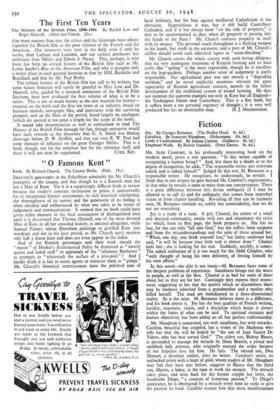The First Ten Years
The History of the British Film; 1844-1906. By Rachel Low and Roger Manvell. (Allen and Unwin. 21s.)
FOR more reasons than one, the critics and the historians have always regarded the British film as the poor relation of the French and the American. Our inventors were later in the field, even if only by weeks, than Latham and .Lumiere, and our earliest producers less ambitious than Maks and Edwin S. Porter. This, perhaps, is why there has been no critical history of the British film such as Mr. Lewis Jacobs's Rise of the American Film and why it occupies only a minor place in such general histories as. that by MM. hardeche and Brasillach and that by Mr. Paul Rotha.
' The critical history of the British film has still to be written, but some future historian will surely be grateful to Miss Low and Dr. Manvell, who, guided by a research committee of the British Film Institute, have now produced the first volume of what is to be a series. This is not so much history as the raw material for history— material on the birth and the first ten years of an industry, based on business records, newspaper files, and interviews with the surviving pioneers, and on the films of the period, based largely on catalogues (which are quoted at too great a length for the scope of the book). It would take determination as well as enthusiasm to read The History of the British Film through for fun, though enterprise would have such rewards as the discovery that G. A. Smith was filming close-ups before D. W. Griffith, and that our own R. W. Paul had some measure of influence on the great Georges Melies. This is a book, though, not for the armchair but for the reference shelf, and
there it will not soon be supplanted. Cyan, RAY.


































 Previous page
Previous page